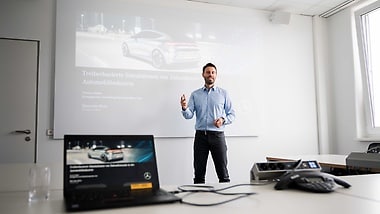Thomas, with your team you evaluate the financial opportunities and risks for Mercedes-Benz. What is the greatest challenge for you in doing this?
Today's world is changing at an astounding rate – driven by innovations, new technologies, and regulations. In the past, companies maintained their strategic line for many years. Nowadays, we have to keep a constant watch on changes in the sector and consider all possible interactions. The job of my team in Strategic Divisional Controlling is to identify economic factors that influence Mercedes-Benz at an early stage, to extrapolate financial risks and opportunities for the company from these factors, and to develop scenarios on the basis of which our management can make sound decisions.
What are these opportunities and risks, for example?
It’s about having transparency on how risky our corporate planning is. With regard to the opportunities, we give special consideration to market and technology changes. A example is electric mobility and the question: "How do we have to position ourselves with our models in order to be profitable?" Our motivation is to help management in its ability to correctly assess such factors. This requires not only a good feel for numbers, but also good communication skills.
To what extent is communication important in this?
A large part of my work involves consulting with colleagues from different units who have the required expertise in the various issue complexes – from Development Controlling to Production Controlling and all the way to External Affairs. A number of questions have to be answered: What regulations will affect our products in the future? Which technologies and trends are there on the market? We then use this information to prepare our recommended actions. In doing so, we are not only observers, but actively inspire decision-making processes.
What is your team like?
I head a team, in which everyone has the same business background, but can contribute very different views due to their different specialist areas and previous experience. Overall, there is a lot of passion and power to it. One member of my team is an expert in business valuations, another in data analytics. Our team is a good fit not only professionally, but also on a personal level. This is also something that makes up the work culture at Mercedes-Benz.
,xPosition=0,yPosition=0.5)






,xPosition=0.5,yPosition=0)